| Microsoft Golf | |
|---|---|
 | |
| Developer(s) | Microsoft |
| Publisher(s) | Microsoft |
| Platform(s) | Microsoft Windows |
| Release | 1992 |
| Genre(s) | Sports |
Microsoft Golf is a video game spin-off of the Links series.
| Microsoft Golf | |
|---|---|
 | |
| Developer(s) | Microsoft |
| Publisher(s) | Microsoft |
| Platform(s) | Microsoft Windows |
| Release | 1992 |
| Genre(s) | Sports |
Microsoft Golf is a video game spin-off of the Links series.
Microsoft Golf: The True Challenge of Golf for Windows adapts the Links game engine for Windows, and a Multimedia Edition was also published.
Patrick Marshall for InfoWorld said "The scenery is great, the animation of the players is fantastic, and if you've got sound equipment, you can even hear the birds chirping." [1]
Scott A. May for Compute! reviewed Microsoft Golf for Windows Multimedia Edition and said "the multimedia edition adds many enjoyable extraneous effects but few indispensable enhancements. Newcomers to Links and Multimedia PC games in general, however, will find this product absolutely dazzling." [2]
Mike Kogan for Electronic Entertainment said "this game breaks new ground in its integration of videos into the game play and will be an asset to any sports-loving MPC owner." [3]

The Compact Disc-Interactive is a digital optical disc data storage format that was mostly developed and marketed by Dutch company Philips. It was created as an extension of CDDA and CD-ROM and specified in the Green Book specifications, co-developed by Philips and Sony, to combine audio, text and graphics. The two companies initially expected to impact the education/training, point of sale, and home entertainment industries, but the CD-i is largely remembered today for its video games.

SimCity 2000 is a city-building simulation video game jointly developed by Will Wright and Fred Haslam of Maxis. It is the successor to SimCity Classic and was released for Apple Macintosh and MS-DOS personal computers in 1993, after which it was released on many other platforms over the following years, such as the Sega Saturn and SNES game consoles in 1995 and the PlayStation in 1996.
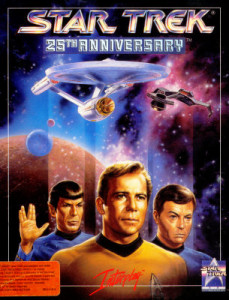
Star Trek: 25th Anniversary is an adventure video game developed and published by Interplay Productions in 1992, based on the Star Trek universe. The game chronicles various missions of James T. Kirk and his crew of the USS Enterprise. Its 1993 sequel, Star Trek: Judgment Rites, continues and concludes this two-game series.
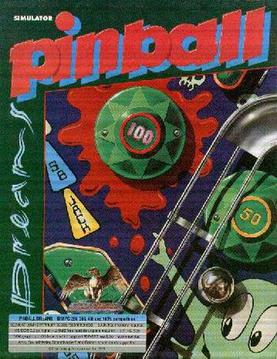
Pinball Dreams is a pinball simulation video game developed by Digital Illusions and originally released for the Amiga in 1992. It spawned several sequels, including Pinball Fantasies and Pinball Illusions. The MS-DOS port was digitally released by Rebellion Developments along with its sequel and Pinball Mania on February 22, 2011 on GOG.com with support for Microsoft Windows. It received an OS X build on April 23, 2013; and a Linux build on August 19, 2014.
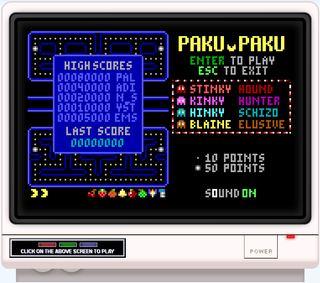
A personal computer game, also known as a computer game or abbreviated PC game, is a video game played on a personal computer (PC). They are defined by the open platform nature of PC systems.

King's Quest VI: Heir Today, Gone Tomorrow is a point-and-click adventure game, first released in 1992 as the sixth installment in the King's Quest series produced by Sierra On-Line. Written by Roberta Williams and Jane Jensen, King's Quest VI is widely recognized as the high point in the series for its landmark 3D graphic introduction movie and professional voice acting. King's Quest VI was programmed in Sierra's Creative Interpreter and was the last King's Quest game to be released on floppy disk. A CD-ROM version of the game was released in 1993, including more character voices, a slightly different opening movie and more detailed artwork and animation.
Microsoft Plus! is a discontinued commercial operating system enhancement product by Microsoft. The last edition is the Plus! SuperPack, which includes an assortment of screensavers, themes, and games, as well as multimedia applications. The Microsoft Plus! product was first announced on January 31, 1994, under the internal codename "Frosting". The first edition was an enhancement for Windows 95, Windows 95 Plus!
Links is a series of golf simulation video games, first developed by Access Software, and then later by Microsoft after it acquired Access Software in 1999. Microsoft also produced its own series of golf games based on Links, under the title Microsoft Golf. The Links series was a flagship brand for Access, and was continued from 1990 to 2003. The first game in the series, Links: The Challenge of Golf, won Computer Gaming World's 1991 Action Game of the Year award.

Microsoft Entertainment Pack, also known as Windows Entertainment Pack or simply WEP, is a collection of 16-bit casual computer games for Windows. There were four Entertainment Packs released between 1990 and 1992. These games were somewhat unusual for the time, in that they would not run under MS-DOS. In 1994, a compilation of the previous four Entertainment Packs were released called The Best of Microsoft Entertainment Pack. A Game Boy Color version was released in 2001.

Windows 3.1 is a major release of Microsoft Windows. It was released to manufacturing on April 6, 1992, as a successor to Windows 3.0.

Microsoft Flight Simulator, commonly known as Microsoft Flight Simulator 1.0, is a flight simulator video game, released in November 1982 for the IBM PC. It is the first release in the Microsoft Flight Simulator series.
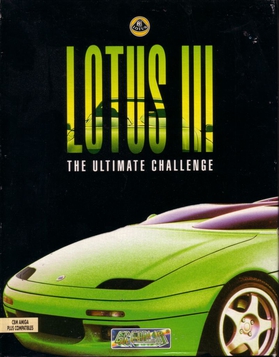
Lotus III: The Ultimate Challenge is the third and final game in the Lotus racing series.

The Incredible Machine is a puzzle video game released in 1993, and the first release in The Incredible Machine video game series. The objective of the game is to create Rube Goldberg machines by arranging collections of objects in a complex fashion, so as to perform some simple task. The Even More Incredible Machine was an extended version of the original, also released in 1993; it had 160 levels, about twice the number of levels in the original game, and had more parts to use in the contraptions.
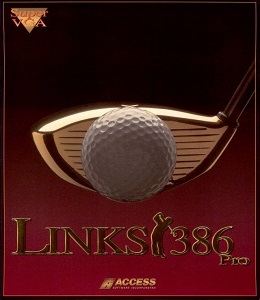
Links 386 Pro is a golf simulation sports game for MS-DOS released in 1992. It is part of the Links series, and was developed by Access Software as the follow-up to Links: The Challenge of Golf (1990). A Macintosh version, Links Pro, was released in 1994. An enhanced version called Links 386 CD was released for PC in 1995 that included audio comments by comedian Bobcat Goldthwait acting as the player's caddie, and an aerial flyby of each hole streamed from the game's CD-ROM. Re-branded versions of the game were also released for Microsoft Windows under the titles Microsoft Golf 2.0 (1994) and Microsoft Golf 3.0 (1996), part of the Microsoft Golf series.

3-D Dinosaur Adventure is an educational video game by Knowledge Adventure released on CD-ROM for MS-DOS compatible operating systems in 1993. Versions for Macintosh and Windows 3.x were published in 1996. A 1997 re-release and an updated version for Macintosh and Microsoft Windows is titled 3-D Dinosaur Adventure: Anniversary Edition.
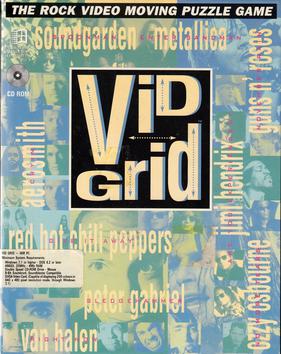
Vid Grid is a tile-matching full motion video puzzle game originally developed by Geffen Records and published by Jasmine Multimedia Publishing for Windows on September 13, 1994. It was later ported to the Atari Jaguar CD by High Voltage Software in 1995, where it was included along with Blue Lightning as one of the pack-in games for the peripheral when it launched. It is the first entry in the series of the same name.
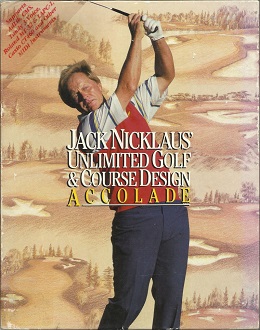
Jack Nicklaus' Unlimited Golf & Course Design is a 1990 golf video game developed by Sculptured Software and published by Accolade for the Amiga and MS-DOS. A Super NES version with the same golf courses, titled Jack Nicklaus Golf, was released in May 1992. It is the second in a series of golf games named after golfer Jack Nicklaus, following Jack Nicklaus' Greatest 18 Holes of Major Championship Golf (1988).
Jack Nicklaus is a series of golf video games named after golfer Jack Nicklaus. The first game, Jack Nicklaus' Greatest 18 Holes of Major Championship Golf, was developed by Sculptured Software and published by Accolade. It was released for various platforms beginning in 1988. Accolade would publish subsequent games in the series for the next decade, before selling the rights to Activision in 1998. Activision published a sixth game in the series, Jack Nicklaus 6: Golden Bear Challenge, in 1999, but chose not to publish a sequel due to poor sales. The next game in the series, Jack Nicklaus Perfect Golf, was released by a new company in 2016.

Links: The Challenge of Golf is a golf video game developed by Access Software. It was published for MS-DOS in 1990, followed by the Amiga in 1992. A Sega CD version, developed by Papyrus Design Group, was released in 1994. It is the first game in the Links series, and was followed by Links 386 Pro (1992). A Microsoft Windows version, titled Microsoft Golf, was released in 1992 as the first game in the Microsoft Golf series.
{{cite web}}: |first= has generic name (help)